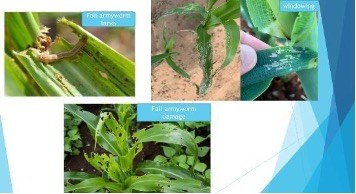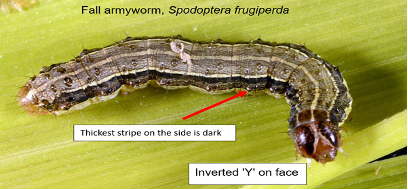This is the first short news article written by students, during the professional development class of Spring 2023, about each other's research.

Adam Scherr
Student Research Spotlight - Adam Scherr
By Winnie Onyango


“Wow, this maize field looks green! Wait, no, it is under attack! What made these holes on the leaves?” The farmer is becoming increasingly worried as he walks through the maize field. The damage is caused by the fall armyworm, a worldwide pest in maize that causes damage at the larval stage (caterpillar) by chewing on the leaves. Fall armyworm populations can reach very high levels making it hard to control, leading to a significant loss of crop yield.
According to Adam Scherr, an Entomology master’s student from Felton and Hoover Labs at Penn State, “the problem lies in the fact that maize cannot detect and defend itself against the fall armyworm attack.” Adam is determined to understand how fall armyworm avoids triggering the maize plant’s defenses.
In normal circumstances, maize produces plant hormones (phytohormones) as a defense against insects and pathogens. The plants release phytohormones that are specific to the stressor. For instance, plants produce the phytohormone jasmonic acid (JA) to trigger plant defenses against insect chewing damage, and the phytohormone salicylic acid (SA) when they are attacked by microbes or sap-feeding insects.
Why is it difficult for maize to detect fall armyworm attack? Previous studies found that fall armyworm injects maize leaves with salicylic acid as it feeds. This alters the normal response of maize so that it cannot detect or defend itself against fall armyworm attack. Instead, it is fooled into defending against a microbial attack. The faulty plant defense response allows fall armyworm to continue feeding on maize.
How can the fall armyworm produce a plant hormone? One hypothesis is that fall armyworm has a complex of gut bacteria (a gut microbiome) that helps it to produce these phytohormones. Adam will carry out experiments to test this hypothesis.
Adam will compare two samples of fall armyworm, one sample raised under sterile conditions- without a gut microbiome – and another sample raised under normal conditions, with a complete gut microbiome. He will crush the two types of caterpillars and run a chemical analysis to test the presence of the phytohormones. According to Adam, these studies will allow him to determine if fall armyworm produces phytohormones or if the gut microbiome produces the phytohormones. If his results are not conclusive, Adam is prepared to perform further tests to determine if fall armyworm collects and sequesters phytohormones from plants and reuses them in the future to alter plant defense.
Once it is known how armyworm produces the salicylic acid to disarm the plant defenses, researchers can use the knowledge to figure out how to stop it and prevent the loss of maize self-defense mechanisms. These new tools to reduce fall armyworm attacks will increase food security and provide a better livelihood for farmers.
Adam is excited to discover new mechanisms for plant-insect interactions in his research. “Once we know how fall armyworm produces these phytohormones, then future studies can be done to figure out how to stop that and we can stop insect pests from altering the maize plant’s self-defense mechanism.” says Adam.
Adam Scherr is a Master’s Student in the Entomology Graduate Program. He is co-advised by Professors Kelli Hoover and Gary Felton.

